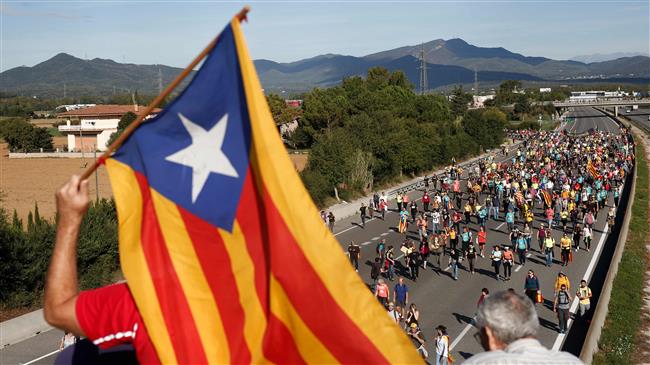Spain: Protests held in Catalonia over conviction of separatist leaders
Pro-independence protesters have staged rallies in Spain’s Catalonia region, blocking a railway and several motorways.
Police in Spain said on Wednesday they arrested 51 people across Catalonia overnight after protests descended into clashes with police in many cities.
Protesters took to the streets on two consecutive days after the Monday jailing of nine separatists over their role in a failed independence bid.
Rallies were held in the Catalan capital of Barcelona and other cities, and pro-independence groups staged sit-ins outside Spanish government offices in a number of Catalan cities late Tuesday, with around 40,000 people taking part in Barcelona and 9,000 in the separatist stronghold of Girona, according to police.
In Barcelona, police charged hundreds of masked demonstrators who threw projectiles at officers and set garbage bins and cardboard boxes on fire.
National and regional police arrested 29 people in the province of Barcelona, 14 in Tarragona Province, and eight in Lleida, according to Spain’s Interior Ministry.
The ministry said 72 police officers were injured in the clashes, including several who suffered broken bones.
A high-speed train between Barcelona and Figueres, a town not far from the French border, was blocked due to sabotage, the central government said in a statement.
Several streets in Barcelona were cut off because crews were cleaning up debris from 157 fires set overnight, it added.
The protests erupted after the Spanish Supreme Court issued heavy prison sentences of between nine and 13 years for Catalan separatist leaders convicted of sedition over a 2017 referendum and a short-lived declared independence by Catalonia’s former pro-independence leader Carles Puigdemont.
Madrid pushes to have separatist leader extradited from Belgium
Meanwhile, Belgium said it had received a third arrest warrant request from Spain’s Supreme Court to hand over Puigdemont.

Puigdemont went into self-imposed exile in Belgium in autumn 2017 after Catalan separatist leaders organized a referendum that Spanish courts had ruled illegal.
“Considering the complexity of the file and the two European arrest warrants previously sent against Mr. Puigdemont, the case will require a thorough judicial analysis,” the Brussels prosecutor’s spokeswoman said on Wednesday.
It may take weeks to reach a decision, she said, adding that the key issue for local authorities would be to decide if the convictions for sedition were legally recognized in Belgium.
Belgian courts had used the same criterion to reject the first two Spanish requests.
The latest warrant was submitted in Spanish. The law requires that it be sent in one of Belgium’s three national languages or English, so Spain will send a new one next week, the spokeswoman said.
Source: Presstv





